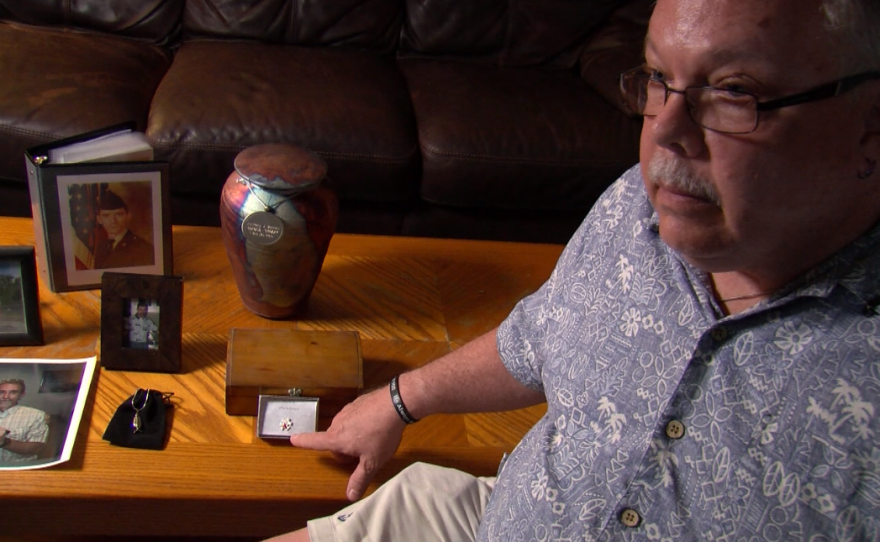This is KPBS Midday Edition. I am Maureen Cavanaugh . When HIV first started spreading in the US, it was a death sentence for many. Today, it is manageable for those with access to the right drugs. There is still no cure. A team of researchers in San Diego says to get there, scientists need to study patients at the end of their lies. David Wagner tells us about the ambitious new study and the people signing up for. Okay. Blake Miller comes to life when he opens the door for his little dog This is Sage. This is sentiment. Cayenne and ginger round out the pack. He calls them the Spice Girls. These days, the house is quiet. Miller's long term partner died from ALS. They were both in the military when you could get kicked out for being gay. It was a different time but for anyone like Miller's partner who was HIV positive. He probably -- he probably lost 100 mice. The mind that he did have, they were sick and they live to the fullest they could. Against the odds, Bennett survived to see HIV become something people could live with. Along the way, he participated in research studies and went ALS give him a month to live, he wanted to keep giving back. Over the years, you get to learn to know somebody and his biggest thing was helping others. That is why a new research effort came in, the last gift study focuses on HIV patient at the end of their lives. Patients stop taking the drugs towards the end and they let researchers draw blood regularly to monitor the activity of the virus. They consent to having bodies autopsied within hours of death. When he asked if he would donate his body. We both smiled and he said yes. Anything you want. Davey Smith leads the study. He says the goal is to find out how the virus persists in patient's bodies how changes and how it comes back when drugs do not keep it under control. The vast majority, the virus comes back in 4 weeks. Where it is hiding is a no. This is what is needed to advance research towards developing a and it is ethical to study HIV patient who stop taking the meds when they are already at neared death. We are not trying to cure what is causing them to be terminally ill. When they participate, they are doing so of the goodness of their heart. Specs are they a is an outreach coordinator and she talks with people who lived through the AIDS crisis of the 80s and 90s and had to watch friends die. They did not know why they didn't and they made. They want to give something back. They realized this study asks a lot of patience and the loved ones. Jules wonders if it is work it. In the end, are we really going to find a cure ? He thinks too much research is focused on a cure when HIV patients are dealing with aging related problems like cognitive impairment, frailty and higher cancer rate and he says those are not adequately addressed. Should we do cure research? Yes. But it is sucking the air on the aging problem. He agrees the more immediate needs are important to address but he thinks efforts like the last gift study are important also. We need a cure because thousands of people still get infected every year and thousands die. There is still a stigma attached to it. Anthony Bennett is the only patient to have completed the study and researchers say it is too early to report results. Blake Miller says he is proud of his partner. Knowing it was the laughed thing he could do, it made great. They aim to enroll five patients per year over the next five years. KPBS news Joining me is Doctor Smith, the leader of the last gift study. Welcome to the program. For having. We heard he wanted to autopsied the bodies within hours of death. Why so quickly? HIV virus is a fragile virus. It is made of an asset called RNA. In doing autopsy studies, infective individuals, the virus degraded quickly. We needed a way to preserve the virus before it degraded so we could study it. When this study -- we have a short period of time between death to autopsy so we can preserve as much is there for the study. What kind of information might you find these autopsies that you would not from a patient who actually died of complications from HIV/AIDS. These are controlled. These people are dying of other things. We all die so they die of cancer and ALS but in this situation, since it is very control, the virus is coming back and we can see where it populates in the different parts of the body. Does going without the meds in the last weeks or maybe a month or so of a terminal patient's life cause them additional health problems? It might. It is their choice. What we saw when we were preparing for the study is that people who were infected and were going to die of something else, they did not want to take medicines anymore. About half of the individuals decided that. That left us an opportunity to study them during that time. It populates the different tissues that we are looking for at that moment, we can then figure out which virus was new and which was old and which was alive and which is old. We can develop therapies to eradicate it. You say this research could lead to more aggressive form of experimental treatments. Is anyone doing that work now for HIV patients ? They are. There are cure efforts across the country and the world. They are using new medications called immune modulators. Those therapies can be rather risky. At the moment, they are trying to minimize the risks but they are tried in people who are otherwise healthy. They will live long and productive lives but they want to get back to the community so they are undergoing the cure studies. Those medications, especially the immune modulators might carry a risks or a lot of risks. What we found during our preparation for the current study is that some people would be interested at the end of their life. They accept more risk. Does that risk involve the risk of death for the healthy people who are undergoing these test ? Perhaps. At the moment, none of those studies are ongoing. This is hypothetically thinking about is this an ethical way to test the more risky compounds. There has been a person who has been cured of HIV. Isn't that right ? Tell us about "First Person" . Just like our patient who was adamant that we use his name, the Berlin patient, his name is Timothy Brown and he was cured through multiple transplants with a specific type of bone marrow. It was very risky but it was to save his life from leukemia. There has been no detectable HIV virus in this patient, even though he is not on medication ? He is not on therapy and the virus has not come back. There is reports that they can small bits of virus but it does not looks like that virus is alive. Is that the thing that could be replicated in other patients ? Yes. That is a big effort, to figure out what happened with Mr. Brown and why the virus is not able to come back. Back in the 1990s, I believe, when you were in medical school, AIDS was for many people a death sentence. What do you think the future holds for people living with HIV ? That is a good question. I started internship in 1986 and the hospital was full of individuals dying of AIDS. I witnessed a modern medical with the new medications and people got up and walked out and lived normal and happy lives as long as anybody else. We did not believe that was possible until it happened, which was amazing. The same thing can happen with the cure efforts. Nobody believes it can happen but one day, it will happen and they say it will be possible. I think that is what we are shooting for but people now are growing older and they are getting age-related disease and everything that we all get and we all die of something. Luckily, people can take the medicines and do well that we currently have. They have no increased risk of mortality. You are hoping more people will be willing to donate bodies to this research. Have people in the HIV community been receptive to this? It is funny. When I talked to some of my colleagues, they are saying you cannot. This is a vulnerable population. You have to be careful with research. I agree. We engage in lots of emphasis before him. My colleagues can be paternalistic and you cannot engage people but when we went to talk to people about the research study when it was hypothetical, these are the last few moments I have, I feel like they are wasted because I am not giving back to the community. Come to my community. It was uplifting to hear those things. This study was available, it was last your, I would anticipate. When I asked my colleagues, if you were at the end of your life and you had an opportunity to do research, would you do it ? I never thought about that. Yes, I would be interested. It is more of a balance between being the participant and the researcher and thinking about different aspects of it. I have been speaking with Doctor Smith. He is the leader of the last gift study. Thank you.
Back when HIV first started spreading in the United States, it was for many a death sentence. Today, it has become manageable for those with access to the right drugs. But there is still no cure. And a team of researchers in San Diego says to get there, scientists need to study HIV patients at the end of their lives.
The Last Gift study at UC San Diego is a unique new research effort focusing on HIV patients with a terminal illness such as cancer, ALS or advanced heart disease. Participants must have a prognosis of less than six months to live. When they near the end of their lives, they stop taking their HIV medications and let researchers draw blood regularly to monitor the activity of the virus. They also consent to having their bodies autopsied within hours of death.
UC San Diego School of Medicine professor Dr. Davey Smith leads the study. He said the goal is to find out how the virus persists in patients' bodies, how it might be changing in different organs and how it fights back when drugs are no longer keeping it under control.
"When people stop their medications — the vast majority of them — the virus comes back within about four weeks. And where that virus comes from, and where it is hiding while the therapy is on, is still unknown," Smith said.
Careful observations at the end of life, rapid autopsies and virus genome sequencing are what is needed to advance research toward developing a cure, Smith said. And since it would not be ethical to ask otherwise healthy HIV patients to stop taking their medications, this kind of research can only be done on those already near death.
"Here, it is very clear: they are not going to benefit from this study," Smith said. "We are not trying to cure whatever is causing them to be terminally ill. So when they participate, they are doing so really out of the goodness of their hearts."
The first participant to go through the study was Anthony Bennett, who died in July a few months after being diagnosed with ALS.
Bennett lived in Oak Park with his long-term partner Blake Miller and their four energetic little dogs Cayenne, Ginger, Cinnamon and Sage. The couple called them their "Spice Girls."
"This is him in his Army uniform," Miller said, holding a photograph of Bennett as a young soldier.
They were both in the military back in the 1980s, when you could get kicked out just for being gay. It was a different time. Not just in the military, but for anyone — like Bennett — who became HIV positive.
"He probably lost over a hundred friends that died of HIV," Miller said. "And the friends that he did have were of the mind that, you know, we're sick. We could die. But we're going to live. And they lived to the fullest that they could."
Against the odds, Bennett survived long enough to see HIV become something people could live with, thanks to antiretroviral drugs. Along the way, he participated in many studies. Miller said Bennett was motivated to participate in research in part due to feelings of survivor's guilt. And when ALS gave Bennett only months to live, he wanted to keep giving back in some way.
"Over the years, you get to learn to know somebody," Miller said. "And his biggest thing was helping others."
That was where the Last Gift study came in. Researchers discussed the aims of the study with Bennett, and he consented to it. Miller was also on board.
"When they asked us if he would donate his body, he looked at me and I looked at him. We both smiled and he said 'yes, anything you want,'" Miller said.
Susanna Concha-Garcia is an outreach coordinator for the study. She talks with lots of people like Bennett, who lived through the AIDS crisis of the 1980s and '90s, and had to watch their friends die.
"Or they were caretakers themselves," Concha-Garcia said. "They took care of friends who eventually died. And they don't know why they didn't. They're the ones who made it. And they want to give something back."
The researchers realize this study asks a lot of patients. It also asks a lot of their friends, family and partners, who must call researchers as soon as they can after their loved ones die. The Last Gift study has doctors on call, with the goal of completing autopsies within 6 hours of death in order to get as accurate a picture of viral activity throughout the body as possible.
National AIDS Treatment Advocacy Project executive director and HIV activist Jules Levin wonders if all of this is worth it.
"In the end, are we ever really going to find a cure?" he asked.
Levin said he thinks too much research is focused on a cure at a time when more and more HIV patients are dealing with aging-related problems like cognitive impairment, frailty and higher cancer rates — problems that he feels are not being adequately addressed.
"Should we be doing cure research? Yes," Levin said. "But it's sucking all the air out of the aging problem in this country."
Smith agreed that the more immediate needs of an aging HIV population are important to address. He said his colleagues at UC San Diego are working on that in other ways. But he thinks efforts like the Last Gift study are important too.
About a decade ago, a man known as the "Berlin Patient" was effectively cured of HIV. And researchers like Smith have been working to find out if cures could be developed for others too.
"We need a cure for HIV because thousands of people still get infected in the United States every year. And thousands of people die," Smith said. "And there's still a stigma attached to it. So, having a cure for HIV would be one of the modern miracles, if possible."
For now, the Last Gift study is only doing observational studies on patients at the end of their lives. But Smith says this research could eventually progress to more aggressive experimental treatments, perhaps tweaking patients' immune systems in attempts to completely eradicate the virus.
So far, Anthony Bennett is the only patient to have completed the study, and the researchers say it is far too early to report any results. Blake Miller said he is proud of his partner.
"For him, knowing that it was the last gift, the last thing he could do… it just made him very happy," Miller said.
The Last Gift study aims to enroll about five patients per year over the next five years.






